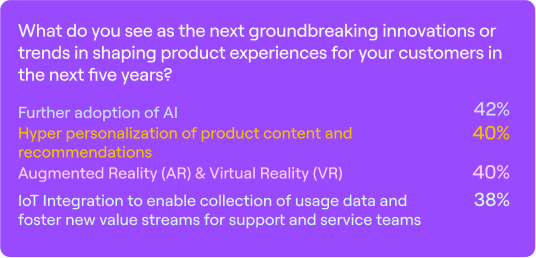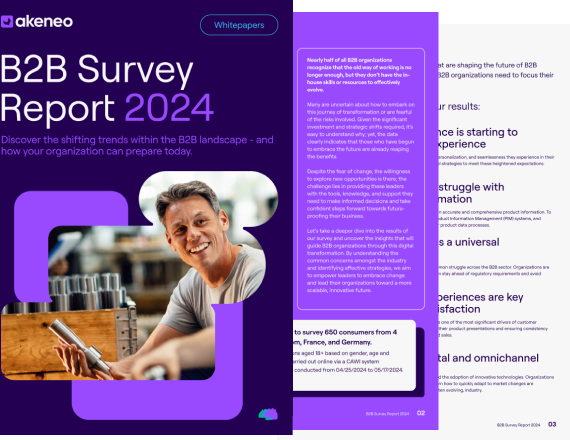Discover the key findings from our recently released survey of B2B industry leaders, uncovering the challenges and opportunities B2B organizations are facing today. From the increasing demand for B2C-like buying experiences to the complexities of managing product information and maintaining regulatory compliance, this article offers a snapshot of the critical insights that will shape the future of B2B.

Table of Contents
Keywords
The B2B landscape is in the midst of a significant transformation - with rapid technological advancements and evolving customer expectations, businesses are being pushed to rethink their strategies.
To better understand the challenges and opportunities that lie ahead for B2B organizations, we conducted a comprehensive survey targeting industry leaders and decision-makers in the B2B industry. What we found was that, while a significant number of these leaders recognize the importance of evolving and adapting to new technologies and processes in order to build sustainable growth, there is still a palpable sense of hesitation.
Let’s take a look at a few of the key findings from our survey and discuss what they mean for the future of B2B organizations - and while this overview provides valuable insights, you can download the full report for a comprehensive analysis that can help your organization navigate the changing landscape with confidence.
Today’s B2B customers expect the same level of convenience, personalization, and seamlessness that they experience when shopping as consumers.
For instance, 90% of B2B organizations plan to significantly grow their use of online marketplaces in the next two years. These platforms, traditionally associated with B2C transactions, are becoming a crucial tool for B2B buyers to compare products, check prices, and make purchases with ease.
Digital self-service portals, social media platforms, and marketplaces are also becoming integral to the B2B buying process, enabling customers to engage with brands and make purchasing decisions independently.

Our survey also revealed that 99% of B2B organizations face challenges with managing product information.
Despite the availability of advanced tools to help address these issues, 40% of organizations still manage product information manually. This reliance on outdated methods is a significant area for improvement, as manual processes are prone to errors and inefficiencies that can impact product launches and customer satisfaction.
Another major concern highlighted in our survey is the challenge of maintaining regulatory compliance. Nearly all respondents (99%) indicated that they face multiple challenges in this area, with 50% citing supply chain management as their top compliance concern.
The complexities of navigating ever-changing regulations, especially across different regions, make it critical for B2B organizations to invest in robust compliance solutions. Automation is a key enabler here, but 45% of respondents still find it challenging to implement these technologies effectively.
In the competitive B2B landscape, delivering high-quality product experiences is essential for customer satisfaction and business success. Our survey found that two-thirds of senior managers see increased repeat business and conversions as key benefits of offering exceptional product experiences.
However, many organizations struggle to deliver these experiences consistently. A comprehensive Product Experience (PX) strategy can help B2B companies elevate their customer engagement across all touchpoints, driving more profitable sales and fostering stronger customer relationships.
The final key takeaway from our survey is the growing importance of digital and omnichannel strategies in the B2B sector. A significant 85% of companies have already adopted a digital sales strategy, with digital channels now accounting for nearly half of total revenue for many businesses.
When asked to look ahead, the B2B industry leaders we interviewed identified several innovations that they expect to shape the future of B2B product experiences the most; these include further adoption of AI, hyper-personalization of product content, and the integration of augmented reality (AR) and virtual reality (VR) to create more immersive customer experiences.

Navigating the future of the B2B landscape will not be easy, and requires a strategic blend of technology adoption, customer-centricity, and data efficiency. From mimicking the seamless, personalized experiences of B2C to grappling with the complexities of product information management and regulatory compliance, the path forward is fraught with obstacles but also rich with potential.
As customer expectations evolve, so too must the approaches that businesses take to meet them. Organizations that invest in robust Product Experience (PX) strategies, leverage the right technology and automation, and prioritize regulatory compliance are better positioned to thrive in this developing industry.
For a deeper dive into these trends, more critical insights, and actionable strategies for your organization, be sure to download our full 2024 B2B Survey Report as it’s packed with valuable insights that can help you navigate this period of change and position your business for long-term success.
Download the 2024 B2B Survey Results Report here.
Download the comprehensive report based on the findings of our survey of B2B professionals to receive insights and actionable tips on navigating the tricky waters of the B2B industry.
